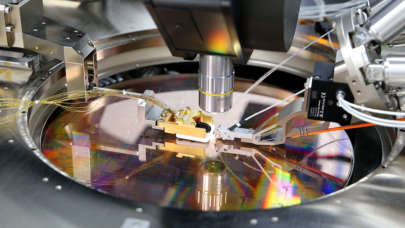Aug. 18 — NCSA’s Blue Waters project will offer a graduate course on High Performance Visualization for Large-Scale Scientific Data Analytics in Spring 2015 and is seeking university partners who are interested in offering the course for credit to their students.
This semester-long online course will include video lectures, quizzes and homework assignments and will provide students with free access to the Blue Waters supercomputer. The course is intended for graduate students in computer science or areas related to computational sciences who are interested in learning how to use visualization to analyze large-scale scientific data sets and also will be of interest to students who are considering scientific visualization as a research topic for their advanced studies.
The instructor is Dr. Han-Wei Shen, professor of Computer Science and Engineering at the Ohio State University. Participating institutions will need to provide a local instructor who will be responsible for advising the local students and officially assigning grades. Students will complete the online course exams and exercises as part of their grade.
Prerequisites for participating graduate students include:
- Experience working in a Unix environment
- Experience developing and running codes written in C or C++
- Knowledge in 3D computer graphics and OpenGL/GPU programming is recommended
- Knowledge in parallel programming tools such as MPI is recommended
The expectations for students, faculty, and the instruction team are noted below. Interested faculty should contact Steve Gordon, organizer of the Blue Waters course program, at [email protected] or by phone at 614-292-4132.
Expectations for Participants
The expectations of the “collaborating faculty” are that they will:
- Establish a “collaborating course” (possibly a special topics course) on the spring course catalog
- Promote this course to students on their own campus
- View the recorded lectures with their local enrolled students
- Provide office hours to advise the students on the course content
- Proctor the course exam
- Provide regular feedback on the course to Dr. Shen on behalf of the students
The expectations of Dr. Shen and O2PEP team are that they will:
- Provide an initial live webcast to introduce the instructor, TAs, support staff, and introduce remote participants and faculty to one another
- Provide two recorded lectures per week
- Provide exercises and activities for the students
- Provide a web space for all course materials
- Provide regular quizzes to allow the students to assess their own progress
- Provide a mid-term exam and a final exam
- Grade all the quizzes and exams
- Provide TAs to assist all students with questions about the course content, exercises, quizzes, and other materials covered during the semester
- Conduct an evaluation of the course with the participants and collaborating faculty
Expectations of the students:
- Students must register in a “collaborating course” on their own campus
- Students will need their own laptops or desktop systems
- Students are expected to view the recorded lectures as a group with their local “collaborating faculty” to learn/discuss the content as a group
- Students are expected to contact the TAs at the Ohio State University for in-depth questions about the content, exercises, or other materials
- Students will be asked to submit quizzes for self-assessment purposes
- Students will be asked to submit a mid-term and a final exam for determining a grade, with a scale applied according to their own campus grading methods
Course Information
As the size of data generated from numerical simulations continues to increase, visualization is now playing an increasingly more important role in assisting the scientists to obtain insight into the simulation output. To equip students with the ability to analyze very large-scale data sets, this course will provide an in-depth discussion of the state-of-the-art in large scale scientific visualization algorithms and systems. In addition to the fundamental visualization techniques, we will cover parallel implementation of selected algorithms for high-performance architectures such as the Blue Waters supercomputer. Students will get hands-on experience visualizing large-scale scientific data sets.
—
Source: NCSA



























































